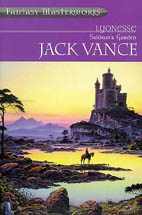The Lyonesse Trilogy - Jack Vance

Suldrun's Garden
The Green Pearl
Madouc
The definition of High Fantasy is not something I'd considered until recently, beyond a vague feeling that it had something to do with princesses and wizards. Apparently the "height" of fantasy depends on how much magic is involved - low fantasy would just be, for example, a straightforward tale of military or political tactics with a quasi-mediaeval setting. The Lyonesse trilogy has been billed as Vance's "high fantasy masterpiece"; alongside the blurb's promises of wizardly rivalries, tragic princesses and the machinations of power-hungry rulers, that creates quite a daunting prospect. But, as ever, Vance's blurb-writers have done him a disservice. This is no worthy tome of ponderous prophecies and humourless heroes; it's a gleefully irreverent epic fairytale, replete with dashing rogues, dastardly ogres and all the trimmings.
"Bah!" muttered Casmir, already bored with the subject. "Your conduct is in clear need of correction. You must throw no more fruit!"
Madouc scowled and shrugged. "Fruit is nicer than other stuffs. I well believe that Lady Desdea would prefer fruit."
"Throw no other stuffs either. A royal princess expresses displeasure more graciously."
Madouc considered a moment. "What if these stuffs should fall of their own weight?"
"You must allow no substances, either vile, or hurtful, or noxious, or of any sort whatever, to fall, or depart from your control, toward Lady Desdea, Dame Boudetta, Lady Marmone, or anyone else. In short, desist from these activities!"
Madouc pursed her mouth in dissatisfaction; it seemed as if King Casmir would yield neither to logic nor persuasion. Madouc wasted no more words. "Just so, Your Majesty."
If Jane Austen ever wrote fairy tales, they'd probably look like this. Kings trade mortal insults with courtly decorum, wayfarers banter with dishonest innkeepers, and supernatural bargains are conducted with scrupulous care over the phrasing. However, there's more than a dash of Vance's dark mischief here too, and alongside the sly banter the details are often dark and gruesome. Captured enemies are casually disembowelled and hung up for display; minor characters suffer various unpleasant deaths at the hands of trolls or other monsters, and others simply pass away unremarked from pneumonia, dropsy or one of the many other hazards of mediaeval life. This is no sanitised Merrie Englande representation of the time - apart from all the magic, you get the feeling that the Dark Ages really looked like this.
There is certainly magic a-plenty here, more than enough to justify the High Fantasy tag, but it's treated in a very commonplace way and hardly affects the plot at all. The main story is in fact a very low-fantasy tale of rival kings plotting to conquer the whole of the Elder Isles, currently divided into several kingdoms; this is largely achieved via the normal means of disputed successions, diplomatic manipulation and outright war.
The first book takes a little while to get going. The opening chapters about Suldrun and her garden are quite slow and mostly serve for background - the real story is elsewhere, as her father King Casmir makes his coldly ambitious plans to unite the isles under his rule. However, once we meet her secret lover Aillas, the story takes off and becomes a lot more interesting. His quest to find their son Dhrun, and Dhrun's own search for his parentage, take up most of the rest of the book, and take in many of the tropes of fairytale quests. A witch with a fox's face and a chicken's feet guards the ford; an amulet protects Dhrun from fear; Aillas is given a walnut shell which always points towards his son. With a style that cleverly implies a patchwork of collated oral tales, full of footnotes, inconsistencies and snippets of history from repeated retelling, it feels like the view of a fairytale from the inside.
The second book is much more focused on the politics, as Aillas struggles to tame his growing empire and defy Casmir's machinations. The pace is much faster and more satisfying, despite a strange interlude towards the end where a couple of characters are transported to a parallel world for a few chapters. Book three returns to the fairytale style, and mostly follows Princess Madouc, a fairy changeling who was swapped for Dhrun at birth but who most believe to be Casmir's granddaughter. This is probably the frothiest and least dark of the books, but it still has its share of casual violence and tragedy.
While magic rarely has any major effect on the main political story, there is a side-plot that reeks with it. Master magician Murgen, with his one-time apprentice and scion Shimrod, are trying to thwart the wiles of the sorcerer Tamurello; unfortunately, they don't know what those wiles are, but they probably have something to do with the deceased witch Desmei and her beautiful creation Melancthe. This plot is less successful than the non-magical one; it doesn't get a lot of screen-time, and while Shimrod's efforts to romance Melancthe are entertaining, Melancthe herself is a very empty character. Deliberately so, maybe, but she's still pretty boring to read about.
Lyonesse is an absolute classic of Vance's work. The dialogue is pointed and witty, the worldbuilding is superb and the descriptions are lavish - the banquets of mediaeval fare are almost enough to make your mouth water. It may not be perfect, but it's a fantastic read that conjures up a real sense of the exotic, with more than a few laughs along the way. This is one of my favourite series to reread and I can't recommend it highly enough.
9½/10



2 Comments:
Thanks for blogging this, the Lyonesse Trilogy is one of my favourite Jack Vance books. Isn't his subtle humour the best?
Vance could write about watching corn grow and make it fascinating. This is only one of several Vance series that people read over and over without tiring of them. I just listened to the audio version, which makes at least a dozen times I've enjoyed the series since 83 when Suldrun's Garden was published. The audio production of Lyonesse was good but could have been better. More of Vance's work should be performed by top shelf actors. The performance of Araminta Station narrated by Simon Vance is maybe the best Vance audiobook recording so far. I wish the whole Cadwal series had been recorded but it hasn't yet.
Post a Comment
<< Home